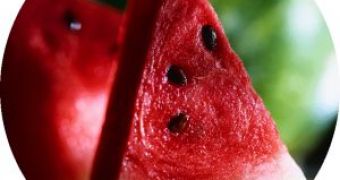Watermelons are believed to have originated in India, where they are extensively used for their sweet taste and beneficial properties upon our health, but some experts say that they may have also come from tropical Africa. Watermelon is the fruit of a vine-like herb and has a dark green skin and rich red flesh.
Watermelon is the tasty and flavored fruit that we usually eat during summer in order to keep our bodies hydrated and refreshed, as it contains 90% water. This fruit has been used since ancient times by various peoples to protect the body from losing the necessary amount of water and from getting dehydrated during periods of drought. Watermelon was also used extensively when water sources were polluted.
For instance, ancient Egyptians used to welcome tired and thirsty travelers that reached their regions with watermelons. They traditionally offered the visitors big slices of watermelons on trays in order to help them quench their thirst in the most natural and pure way.
The high content of water makes watermelons very beneficial when used in weight loss programs, as they give us the impression of satiety, but have a reduced number of calories. But besides water, melons are laden with vitamin A and C, betacarotene, lycopen, iron, zinc, potassium and other nutritive minerals - which makes them twice as efficient in all kinds of diets, as they help us lose weight or stay fit and also give the body all the vitamins and nutrients it needs to continue functioning in an appropriate manner.
Also, due to the amount of water contained, they are frequently used for body detoxification processes, as the water from melons purifies the body of all waste and then is partially eliminated through urine. This also helps in "cleaning" our kidneys.
Melons intake is also extremely important for preserving our health because they are as rich in iron content as spinach is, which means they are the richest fruits in iron. Plenty of iron is found in red meat, too, but watermelons are more appropriate to be eaten because they are not that rich in calories as meat is.
Iron as a nutritive mineral boosts energy in our bodies, makes us active and provides us with stamina. Iron is tightly linked to the hemoglobin, which transports oxygen from the lungs to all body cells and is also part of key enzyme systems for energy production and metabolism.
Iron also strengthens and protects all the organs within our body and is crucial for menstruating, pregnant or lactating women whose bodies usually lack iron. Iron plays a decisive role in the growth and physical development of children and teenagers, as it helps their bodies grow in a healthy and harmonious way.
Medical experts also found that besides tomatoes, watermelons are one of the richest sources of lycopene - a naturally occurring red pigment in plants that is a very potent antioxidant and anti-anticancer agent. Lycopene is the most active carotenoid and works as an antioxidant against free radicals.
Antioxidant properties of the natural pigments fight against molecular oxidation by the free radicals. In our body, an infinite number of chemical reactions take place every day. A part of the chemical changes in the cells that use oxygen give birth to free radicals, which are harmful for the cells and the organism. An excessive amount of free radicals interact with the DNA or parts of the other cells in the body and may damage them. But the antioxidants in fruits and vegetables counteract and neutralize these organic "enemies."
Moreover, watermelons provide our bodies with high doses of vitamin C that is also a very potent antioxidant and not only.
Besides antioxidant properties, lycopene also helps improving short and long term memory, protects and prevents from heart disorders and some types of cancer. It is extremely beneficial against the prostate and testicles and prevents skin, cervical, breast and prostate cancer. Lycopene is also a detoxifier of the waste in the body and inhibits cholesterol formation.
Vitamin A and betacarotene are also abundant in these fruits and improve the accuracy of our vision, preventing, at the same time, eyes-related diseases such as cataracts or macular degeneration. Betacarotene and vitamin A are usually tightly connected within our body and, besides preserving eyes' health, they help heart to function accurately, strengthen the immune system, prevent against cancer and is an anti-aging and anti-wrinkling agent for the skin.

 14 DAY TRIAL //
14 DAY TRIAL // 

